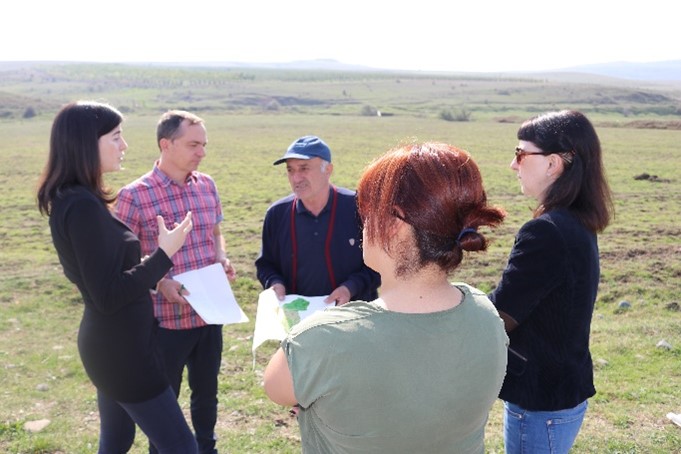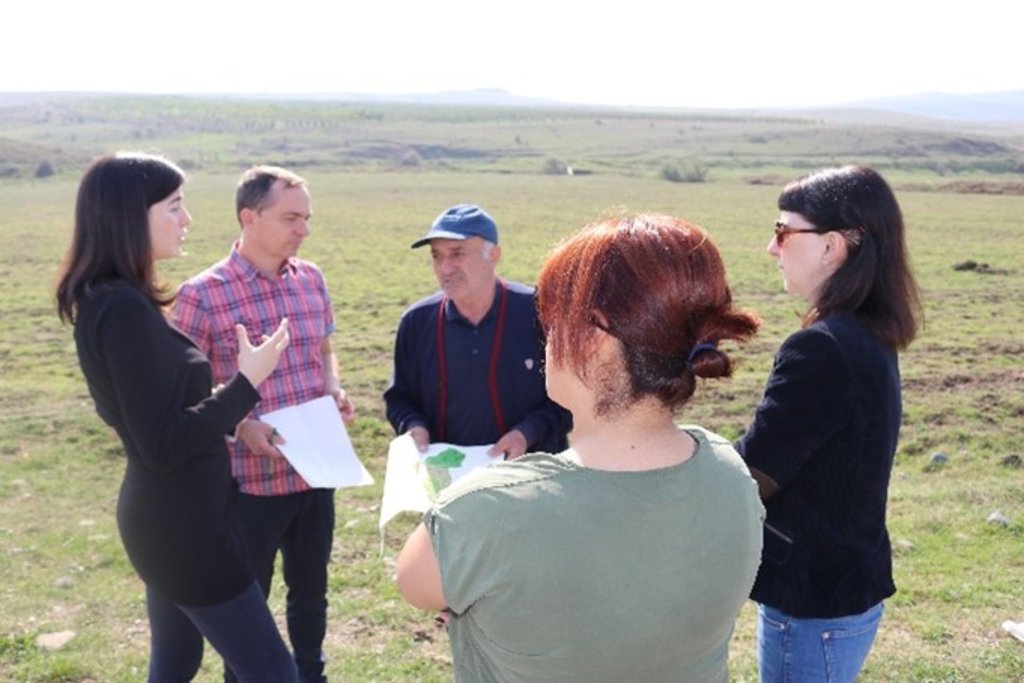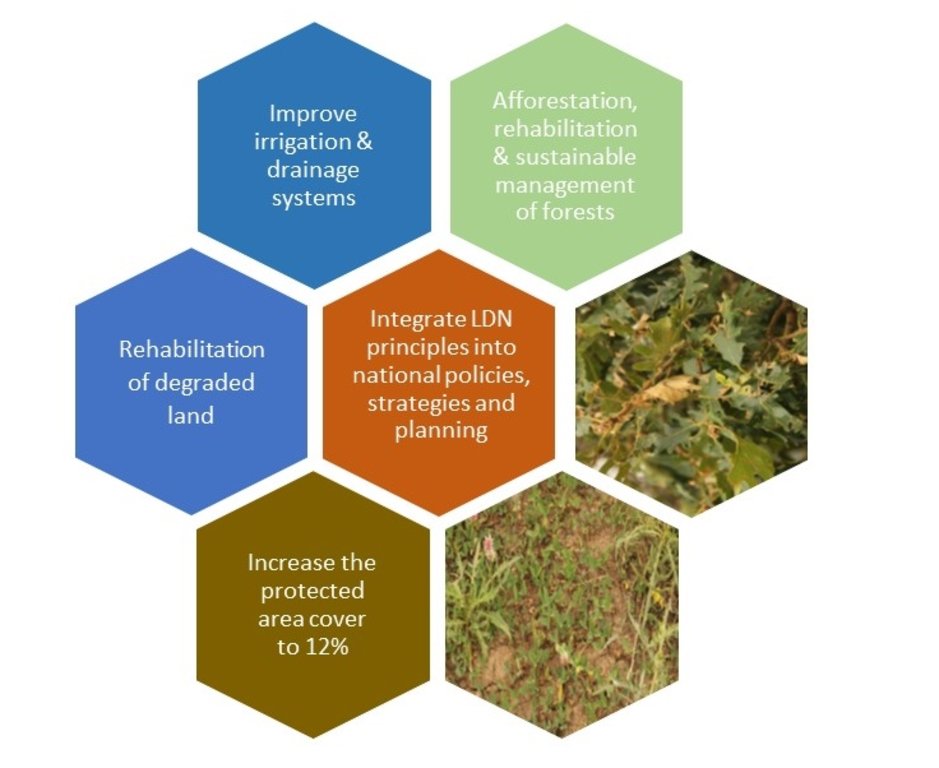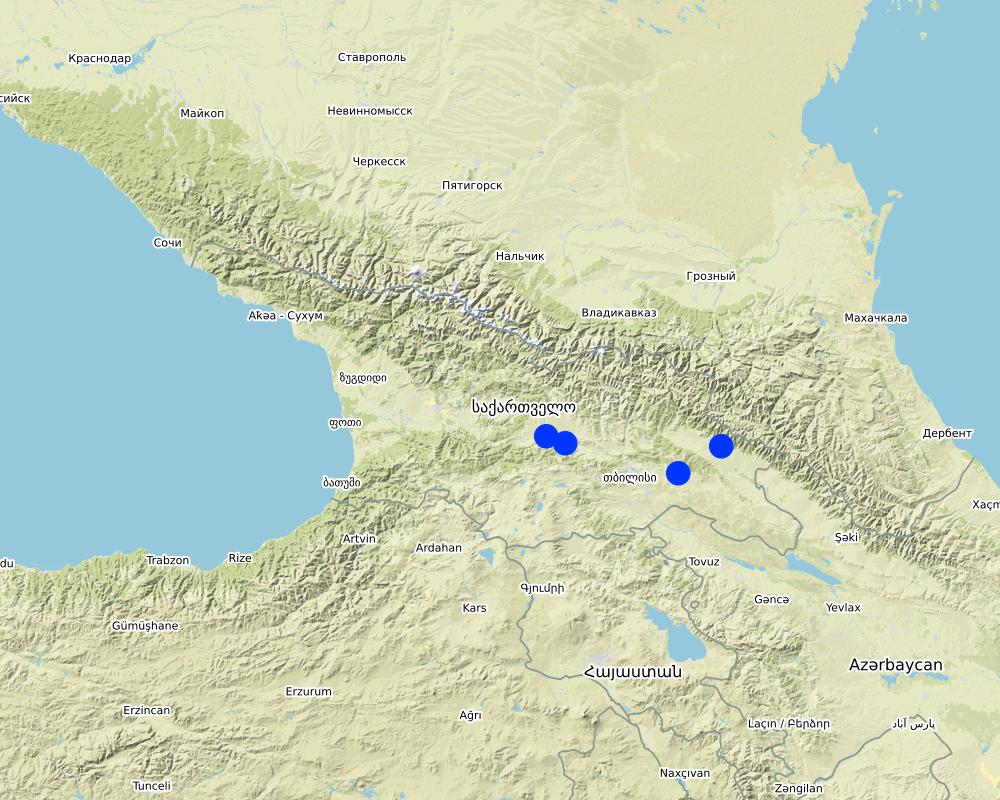Land Degradation Neutrality Transformative Projects and Programmes (LDN-TPP) for sustainable agriculture and rural development [Geórgia]
- Criação:
- Atualização:
- Compilador/a: Daniel Zollner
- Editores: Anneliese Fuchs, Michael Huber
- Revisores: William Critchley, Rima Mekdaschi Studer
LDN-TPP in Georgia
approaches_5902 - Geórgia
Veja as seções
Expandir tudo Recolher tudo1. Informação geral
1.2 Detalhes do contato das pessoas capacitadas e instituições envolvidas na avaliação e documentação da abordagem
Especialista em GST:
Especialista em GST:
Zumbulidze Maia
REC Caucasus
Geórgia
Nome do projeto que facilitou a documentação/avaliação da Abordagem (se relevante)
Generating Economic and Environmental Benefits from Sustainable Land Management for Vulnerable Rural Communities of Georgia (GREENLANDS)Nome da(s) instituição(ões) que facilitou(ram) a documentação/avaliação da Abordagem (se relevante)
Global Environment Facility Georgia (GEF Georgia) - Geórgia1.3 Condições em relação ao uso da informação documentada através de WOCAT
Quando os dados foram compilados (no campo)?
04/11/2019
O/a compilador/a e a(s) pessoa(s) capacitada(s) aceitam as condições relativas ao uso de dados documentados através da WOCAT:
Sim
1.4 Referência ao(s) questionário(s) sobre tecnologias da GST
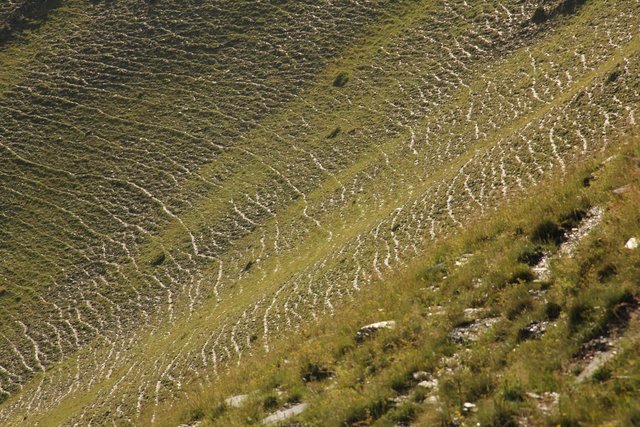
Remote Sensing as a Tool for Land Degradation … [Geórgia]
Land degradation contributes to biodiversity loss and the impoverishment of rural livelihoods in Tusheti. Above all, however, land degradation are triggered by climate change as traditional land use practise might not be adapted to new climate conditions which can cause or speed up degradation processes significantly. On the other hand, …
- Compilador/a: Hanns Kirchmeir
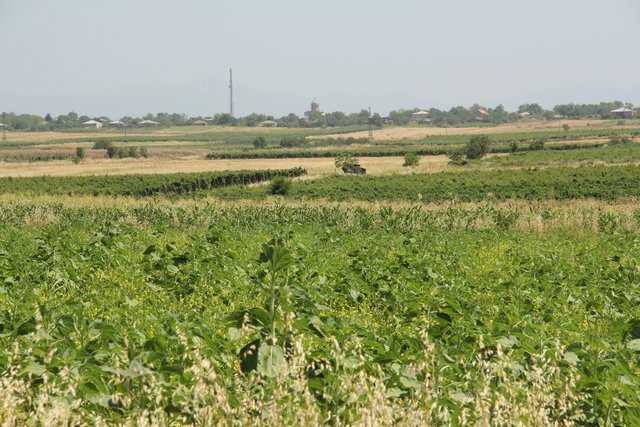
Community Land Use Planning in Arkhiloskalo [Geórgia]
Unsustainable land use practices, such as deforestation, overgrazing and improper agricultural management systems are triggering the loss and degradation of valuable land resources in Georgia. Land use planning is one of the measures among others to contribute to support the integration of good Landscape and Sustainable Land Management (L-SLM) principles …
- Compilador/a: Hanns Kirchmeir
2. Descrição da abordagem de GST
2.1 Descrição curta da abordagem
In the framework of the project ‘Generating Economic and Environmental Benefits from Sustainable Land Management for Vulnerable Rural Communities of Georgia’, Land Degradation Neutrality Transformative Projects and Programmes (LDN-TPP) were developed to implement the LDN targets at municipal level.
The approach defines the process to break down global and international LDN targets and to translate these into local contributions from the municipalities of Gori, Kareli, Kvareli and Sagarejo.
2.2 Descrição detalhada da abordagem
Descrição detalhada da abordagem:
The three-year project ‘Generating Economic and Environmental Benefits from Sustainable Land Management for Vulnerable Rural Communities of Georgia' funded by the Global Environment Facility (GEF), is implemented by the United Nations Environment Programme (UNEP) and executed by the Regional Environmental Centre for the Caucasus (RECC). The initiator and beneficiary of the project is the Ministry of Environmental Protection and Agriculture of Georgia. Within this framework, Land Degradation Neutrality Transformative Projects and Programmes (LDN-TPP) were developed to implement the LDN targets at municipal level.
The project aims to create an enabling environment at the community level to achieve the country's goal of Gender Responsive Land Degradation Neutrality (LDN). The project supports local farmers to apply sustainable land management and climate-smart agricultural practices to promote food security and resilience in order to reduce the impacts of erosion, salinisation and soil fertility reduction in Sagarejo, Kvareli, Gori and Kareli on 20,000 ha of pilot land. As a result, it is expected that there will be an improved understanding of the economics of land degradation and integrated land use planning at national and sub-national levels. In the preceding approach recorded under WOCAT, namely ‘Integrated Land Use Plans (ILUPs) for sustainable agriculture and rural development with special emphasis on SLM, CSA and LDN in four municipalities [Georgia]’, ILUPs were developed for four municipalities providing a detailed spatial basis. A separate study (Ballesteros et al. 2020) compiled baseline information about LDN indicators.
This approach complements the ILUP. It combines the spatial information elaborated for land use planning, the LDN baseline information with national LDN targets, UNCCD principles for LDN and municipal stakeholder priorities to come up with a concrete plan for the municipal contribution to (inter)national targets. Thus, this approach serves to operationalise the national LDN targets at municipal level. At the time of documentation of this apporach, planning was completed and the participatory process for validation and decision-making for concrete targets had been initiated.
Taking this into account, a targeted programme was designed, which breaks down national targets into municipal targets with related activities and spatially explicit priority areas for implementation. This approach serves to operationalise LDN-related recommendations and proposed actions as presented and defined in the Integrated Land Use Plan. It seeks to define the contribution of the municipalities Gori, Kareli, Kvareli and Sagarejo to the achievement of national and global LDN targets.
The output is intended to serve as a starting point for local discussion (especially with the LDN Working Group) to further specify and prioritise the objectives and measures proposed. It provides a solid basis for discussing (a) concrete measures and (b) the areas best suited for these measures. The approach is documented in a consolidated document on how the municipality can contribute to the national LDN goals, based on the specific situation and potentials of the municipality.
The LDN TPP focuses on specific objectives and actions in the area of the municipality and its various functional land units in a pro-active, forward-looking and visionary manner as a contribution to the nationally set LDN objectives and the overall LDN vision. It presents possible and recommended development pathways and focuses predominantly on LDN implementation options through the application and adoption of various SLM and CSA practices.
2.3 Fotos da abordagem
2.5 País/região/locais onde a abordagem foi aplicada
País:
Geórgia
Região/Estado/Província:
Shida Kartlii and Kakheti
Especificação adicional de localização:
Gori, Kareli, Kvareli and Sagarejo
Comentários:
The points are located within the four municipalities of Gori, Kareli, Kvareli and Sagarejo. The land use plan was prepared for the entire territory of the four municipalities.
Map
×2.6 Datas de início e término da abordagem
Indique o ano de início:
2019
2.7 Tipo de abordagem
- Baseado em projeto/programa
2.8 Principais metas/objetivos da abordagem
The approach seeks to define the local contribution of the municipalities Gori, Kareli, Kvareli and Sagarejo to the achievement of national and global LDN targets whilst meeting local needs and priorities
2.9 Condição que propiciam ou inibem a implementação de tecnologia/tecnologias aplicada(s) segundo a abordagem
Normas e valores sociais/culturais/religiosos
- Propício
There is a recognised need to improve land use planning and to counter land degradation as agricultural production is declining
Disponibilidade/acesso a recursos e serviços financeiros
- Inibitivo
Even though funding is provided through the project, the resources available at the municipality are very limited.
Quadro institucional
- Propício
The establishment of Municipal LDN Working groups allows for a concrete discussion of LDN with adequate municipal participation. It also allows for including local knowledge in the planning process
- Inibitivo
Currently, municipalities have very limited capacities for land use planning.
Colaboração/coordenção de atores
- Propício
REC has a very strong presence and links to the municipalities through previous and ongoing projects.
- Inibitivo
This was very challenging due to COVID-19 restrictions. Fewer meetings were held than foreseen delaying the process of discussion of municipal targets and activities.
Quadro jurídico (posse de terra, direitos de uso da terra e da água)
- Inibitivo
For the strategic planning, land tenure was only a minor topic. However, in general, when it comes to the specific location of measures, land tenure will be amongst the key issues.
Políticas
- Propício
Well-supported through municipal involvement.
Governança da terra (tomada de decisões, implementação e aplicação)
- Propício
Municipal LDN group as municipal sounding board was a big plus.
Conhecimento sobre GST, acesso a suporte técnico
- Propício
There are several successful previous projects already providing a good set of measures and creating awareness amongst land users for SLM
3. Participação e papel das partes interessadas envolvidas
3.1 Partes interessadas envolvidas na abordagem e seus papéis
- Usuários de terra/comunidades locais
Various farmers
Visits to the fields with the local farmers, discussions about the type of cultivation
- Pesquisadores
Tbilisi State University
Contribution of expert knowledge during meetings to interpret findings in a municipal context; provision of relevant scientific data;
- Organização não governamental
REC Caucasus
Supervisors, consultants, GIS analyses, participation in the LDN Working Group Meeting
- Governo local
Executive Office of the Gori Municipal Council
I Mayor’s City Hall (formerly Municipal Administration“Gamgeoba”), Municipality of Gori
I Mayor’s City Hall (formerly Municipal Administration“Gamgeoba”), Municipality of Kareli
I Mayor’s City Hall (formerly Municipal Administration“Gamgeoba”), Municipality of Kvareli
I Mayor’s City Hall (formerly Municipal Administration“Gamgeoba”), Municipality of Sagarejo
Participation in the LDN Working Group Meeting
- Governo nacional (planejadores, responsáveis pelas decisões)
Agricultural and Rural Development Agency (ARDA)
Ministry of Environmental Protection and Agriculture of Georgia (MEPA)
Participation in the LDN Working Group Meeting
3.2 Envolvimento do usuários de terra/comunidades locais nas diferentes fases da abordagem
| Envolvimento do usuários de terra/comunidades locais | Especifique quem estava envolvido e descreva as atividades | |
|---|---|---|
| Iniciação/motivação | Nenhum | |
| Planejamento | Passivo | Local land users were consulted to gain experience and insight into the situation of agriculture in the different areas. The interviews were then incorporated in the preparation of the maps and land use plans. Stakeholder priorities formulated during the meetings were the basis for the setting of the municipal targets. Due to COVID 19 the related participatory process to validate the proposed targets, activities and locations has only started recently. Thus, finally the classification would rather refer to "interactive planning". |
| Implementação | Nenhum | |
| Monitoramento/avaliação | Nenhum | M&E will be provided in a later stage once the decisions are made regarding the final activities and priorities |
3.4 Decisão sobre a seleção de tecnologia/tecnologias de GST
Especifique quem decidiu sobre a seleção de tecnologia/tecnologias a serem implementadas:
- Principalmente especialistas em GST, após consulta com usuários da terra
Explique:
After initial consultations, the plan was prepared based on scientific and GIS-based information translating it into a muncipal programme. The process will be concluded once the programme is validated and discussed with land users and municipal administration (ongoing process).
Especifique em que base foram tomadas as decisões:
- Avaliação de conhecimento bem documentado de GST (tomada de decisão baseada em evidências)
- Resultados de pesquisa
- Experiência pessoal e opiniões (não documentado)
4. Suporte técnico, reforço das capacidades e gestão do conhecimento
4.1 Reforço das capacidades/ formação
Foi oferecida formação aos usuários da terra/outras partes interessadas?
Não
4.2 Serviço de consultoria
Os usuários de terra têm acesso a um serviço de consultoria?
Não
4.3 Fortalecimento da instituição (desenvolvimento organizacional)
As instituições foram fortalecidas ou estabelecidas através da abordagem?
- Sim, pouco
Especifique a que nível (níveis) as instituições foram fortalecidas ou estabelecidas:
- Local
Descreva instituição, papéis e responsabilidades, membros, etc.
Within the framework of the project, municipal Land Degradation Neutrality Groups were established comprising municipal stakeholders and land users. This board serves to discuss LDN issues, define priorities and provide knowledge about local phenomena of land degradation (e.g. participatory mapping of degradation)
Especifique o tipo de apoio:
- Reforço das capacidades/ formação
Dê mais detalhes:
Basically, these groups were consulted for the identification of priorities and land-degradation mapping in the municipality. In a follow-up step, these groups will play a crucial role in decision-making and implementation of the programme.
4.4 Monitoramento e avaliação
Monitoramento e avaliação são partes da abordagem?
Não
Comentários:
The current approach designed a LDN-TPP at municipal level. Once the municipality decides about the final priorities and measures to be taken, a monitoring plan will be included.
4.5 Pesquisa
A pesquisa foi parte da abordagem?
Sim
Especifique os tópicos:
- Sociologia
- Ecologia
- Tecnologia
Dê mais detalhes e indique quem realizou a pesquisa:
The designed programme builds on 3 main elements: (1) local knowledge through project-based experiences and implicit knowledge of land users and the LDN group, (2) a spatial analysis of land use within the frame of the land-use planning process (see Zollner, 2021, separate approach recorded under Wocat) and (3) a LDN baseline study about the three global LDN indicators (land cover, net primary production and soil organic carbon) (Ballesteros et al. 2020).
5. Financiamento e apoio material externo
5.1 Orçamento anual para o componente de GST da abordagem
Caso o orçamento exato seja desconhecido, indique a faixa:
- 10.000-100.000
Comentários (p. ex. principais fontes de recursos/principais doadores):
This amount covers the elaboration of four programmes for four municipalities excluding the final implementation. Depending on the funding source and the final political decisions, the implementation of the programmes ranges from 500,000 - 4,000,000 USD. The costs for this process were funded by GEF via UNDP.
5.2 Apoio financeiro/material concedido aos usuários da terra
Os usuários da terra receberam apoio financeiro/material para a implementação de tecnologia/tecnologias?
Não
5.3 Subsídios para entradas específicas (incluindo mão-de-obra)
- Nenhum
5.4 Crédito
Foi concedido crédito segundo a abordagem para atividades de GST?
Não
5.5 Outros incentivos ou instrumentos
Foram utilizados outros incentivos ou instrumentos para promover a implementação das tecnologias de GST?
Não
6. Análise de impactos e declarações finais
6.1 Impactos da abordagem
A abordagem propiciou a tomada de decisão baseada em evidências?
- Não
- Sim, pouco
- Sim, moderadamente
- Sim, significativamente
It provides hard facts and spatial information about degradation, priority areas and potential measures for decision-makers
A abordagem auxiliou os usuários da terra a implementar e manter as tecnologias de GST?
- Não
- Sim, pouco
- Sim, moderadamente
- Sim, significativamente
Not yet. As it is a plan.
A abordagem melhorou a coordenação e a implementação economicamente eficiente da GST?
- Não
- Sim, pouco
- Sim, moderadamente
- Sim, significativamente
It links the land-use planning process (and its results) with scientific information and translates it into actions - it builds on existing knowledge.
A abordagem mobilizou/melhorou o acesso aos recursos financeiros para implementação da GST?
- Não
- Sim, pouco
- Sim, moderadamente
- Sim, significativamente
By linking local priorities with (inter)national obligations, it is expected that it will help to mobilise additional resources.
A abordagem aprimorou o conhecimento e as capacidades dos usuários da terra para implementar a GST?
- Não
- Sim, pouco
- Sim, moderadamente
- Sim, significativamente
It provides solid condensed and local information to the Municipal LDN group
A abordagem aprimorou o conhecimento e as capacidades de outras partes interessadas?
- Não
- Sim, pouco
- Sim, moderadamente
- Sim, significativamente
Close cooperation with international experts and local consultants increased the GIS-mapping capabilities of the national expert.
A abordagem construiu/fortaleceu instituições, colaboração entre partes interessadas?
- Não
- Sim, pouco
- Sim, moderadamente
- Sim, significativamente
The municipal LDN group is a cross-institutional group of municipal stakeholders dealing with land degradation at municipal level.
A abordagem atenuou conflitos?
- Não
- Sim, pouco
- Sim, moderadamente
- Sim, significativamente
This is expected to happen as together with land use planning it identifies priorities, challenges and needs.
A abordagem concedeu autonomia aos grupos social e economicamente desfavorecidos?
- Não
- Sim, pouco
- Sim, moderadamente
- Sim, significativamente
Not yet, as these groups have not yet been involved - but will be involved (particularly land-users) who are the final beneficiaries of the measures.
A abordagem melhorou a igualdade de gêneros e concedeu autonomia a mulheres e meninas?
- Não
- Sim, pouco
- Sim, moderadamente
- Sim, significativamente
It was not a major consideration. Work was only with the Municipal LDN group (which included women).
A abordagem encorajou os jovens/as próximas gerações de usuários de terra a se envolverem na GST?
- Não
- Sim, pouco
- Sim, moderadamente
- Sim, significativamente
It was not a major consideration. Work was only with the Municipal LDN group
A abordagem melhorou as questões de posse de terra/diretos do usuário que inibiam a implementação das tecnologias de GST?
- Não
- Sim, pouco
- Sim, moderadamente
- Sim, significativamente
It addresses and highlights some of the pressing issues.
A abordagem resultou em segurança alimentar aprimorada/nutrição melhorada?
- Não
- Sim, pouco
- Sim, moderadamente
- Sim, significativamente
Not yet, but if implemented, it will make a major contribution.
A abordagem melhorou o acesso aos mercados?
- Não
- Sim, pouco
- Sim, moderadamente
- Sim, significativamente
Not yet, but if implemented, it will make a major contribution.
A abordagem resultou em acesso melhorado à água e ao saneamento?
- Não
- Sim, pouco
- Sim, moderadamente
- Sim, significativamente
Not yet, but if implemented, it will make a significant contribution as water security , sustainable irrigation, and protection of water resources are key topics.
A abordagem resultou em uso/fontes de energia mais sustentável?
- Não
- Sim, pouco
- Sim, moderadamente
- Sim, significativamente
Not a priority.
A abordagem aprimorou a capacidade dos usuários da terra de adaptar-se a mudanças climáticas/extremos e atenuar os desastres relacionados com o clima?
- Não
- Sim, pouco
- Sim, moderadamente
- Sim, significativamente
Not yet, but if implemented, this is supposed to be one of the major contributions of the programme.
A abordagem resultou em emprego, oportunidades de renda?
- Não
- Sim, pouco
- Sim, moderadamente
- Sim, significativamente
Not yet, but it seeks to enhance and secure incomes of farmers in the muncipality and outlines alternative income opportunities
6.2 Principal motivação dos usuários da terra para implementar a GST
- Produção aumentada
- Lucro (lucrabilidade) aumentado, melhora da relação custo-benefício
- Degradação do solo reduzida
- Riscos de desastre reduzido
- Afiliação a movimento/projeto/grupo/rede
6.3 Atividades de sustentabilidade de abordagem
Os usuários da terra podem manter o que foi implementado através da abordagem (sem apoio externo)?
- Sim
Caso afirmativo, descreva como:
The programme seeks agricultural transformation and a change in agricultural practice both reducing land degradation and increasing land productivity
6.4 Pontos fortes/vantagens da abordagem
| Pontos fortes/vantagens/oportunidades na visão do usuário da terra |
|---|
| Allows for a discussion based on maps displaying degradation challenges. This makes it easier to concretly agree on measures and priorities |
| Pontos fortes/vantagens/oportunidades na visão do/a compilador/a ou de outra pessoa capacitada |
|---|
| Combination of stakeholder priorities, local conditions, scientific baseline information and spatially very clear maps |
| Linking different plans and strategies with (inter)national obligations and targets at local level. This is a good basis for attracting funding and targeted interventions |
| Comprehensive, intersectoral and local approach connecting climate change, agricultural development, ecological and social aspects |
6.5 Pontos fracos, desvantagens da tecnologia e formas de superá-los
| Pontos fracos/desvantagens/riscos na visão do usuário da terra | Como eles podem ser superados? |
|---|---|
| Local capacities are rather low and require external funding | Increased capacity building of the Muncipal LDN Group as key resource |
| Pontos fracos/vantagens/riscos na visão do/a compilador/a ou de outra pessoa capacitada | Como eles podem ser superados? |
|---|---|
| Due to COVID 19 a more participatory discussion of targets and exact location and scope of measures is still required (but planned) | The planning process can be extended to enable the participatory process |
| Without a capable local lead, it will be challenging | With REC which has been involved for a long time in the region, capable support and exact knowledge of local capacities is available. |
7. Referências e links
7.1 Métodos/fontes de informação
- visitas de campo, pesquisas de campo
One field visit of the international consultant (Meeting with LDN Municipal Group, participatory mapping, onsite visit, consultations with stakeholders) and several visits of the RECC.
- entrevistas com usuários de terras
During the field visit
- compilação de relatórios e outra documentação existente
7.2 Referências às publicações disponíveis
Título, autor, ano, ISBN:
Ballesteros Canovas, J.A., Da Silva Correia, G., Schlechten, J., Zumbulidze, M. & Stoffel, M. 2020: Report. Generating Economic and Environmental Benefits from Sustainable Land Management for Vulnerable Rural Communities of Georgia. University of Geneva
Disponível de onde? Custos?
REC Caucasus
Título, autor, ano, ISBN:
Huber, M., Zollner, D., Zumbulidze, M., 2021: Sagarejo Land Degradation Neutrality Transformative Programme (LDN-TPP Sagarejo) for sustainable agriculture and rural development with special emphasis on SLM, CSA and LDN (Part B – LDN TPP Sagarejo). Version 2.0. Klagenfurt, Tbilisi, Sagarejo. 56 p.
Disponível de onde? Custos?
REC Caucasus
Título, autor, ano, ISBN:
Huber, M., Zollner, D., Zumbulidze, M., 2021: Kareli Land Degradation Neutrality Transformative Programme (LDN-TPP Kareli) for sustainable agriculture and rural development with special emphasis on SLM, CSA and LDN (Part B – LDN-TPP Kareli). Version 2.0. Klagenfurt, Tbilisi, Kareli. 61 p.
Disponível de onde? Custos?
REC Caucasus
Título, autor, ano, ISBN:
Huber, M., Zollner, D., Zumbulidze, M., 2021: Gori Land Degradation Neutrality Transformative Programme (LDN-TPP Gori) for sustainable agriculture and rural development with special emphasis on SLM,CSA and LDN (Part B – LDN-TPP Gori). Version 2.0. Klagenfurt, Tbilisi, Gori. 55 p.
Disponível de onde? Custos?
REC Caucasus
Título, autor, ano, ISBN:
Huber, M., Zollner, D., Zumbulidze, M., 2021: Kvareli Land Degradation Neutrality Transformative Programme (LDN-TPP Kvareli) for sustainable agriculture and rural development with special emphasis on SLM, CSA and LDN (Part B – ILUP Kvareli). Version 2.0. Klagenfurt, Tbilisi, Kvareli. 54 p.
Disponível de onde? Custos?
REC Caucasus
Título, autor, ano, ISBN:
Zollner, D., Zumbulidze, M., Kirchmeir, H., Fuchs, A. und Huber, M. 2021: Gori Integrated Land Use Plan (ILUP Gori) for sustainable agriculture and rural development with special emphasis on SLM, CSA and LDN. Part A – ILUP Gori. Version 2.0. Klagenfurt, Tbilisi, Gori. 80 p. + documentation volume/ annex.: REC Caucasus, E.C.O- Institute of Ecology
Disponível de onde? Custos?
REC Caucasus
Título, autor, ano, ISBN:
Zollner, D., Zumbulidze, M., Kirchmeir, H., Fuchs, A. und Huber, M. 2021: Kareli Integrated Land Use Plan (ILUP Gori) for sustainable agriculture and rural development with special emphasis on SLM, CSA and LDN. Part A – ILUP Gori. Version 2.0. Klagenfurt, Tbilisi, Gori. 80 p. + documentation volume/ annex.: REC Caucasus, E.C.O- Institute of Ecology
Disponível de onde? Custos?
REC Caucasus
Título, autor, ano, ISBN:
Zollner, D., Zumbulidze, M., Kirchmeir, H., Fuchs, A. und Huber, M. 2021: Kvareli Integrated Land Use Plan (ILUP Gori) for sustainable agriculture and rural development with special emphasis on SLM, CSA and LDN. Part A – ILUP Gori. Version 2.0. Klagenfurt, Tbilisi, Gori. 80 p. + documentation volume/ annex.:REC Caucasus, E.C.O- Institute of Ecology
Disponível de onde? Custos?
REC Caucasus
Título, autor, ano, ISBN:
Zollner, D., Zumbulidze, M., Kirchmeir, H., Fuchs, A. und Huber, M. 2021: Sagarejo Integrated Land Use Plan (ILUP Gori) for sustainable agriculture and rural development with special emphasis on SLM, CSA and LDN. Part A – ILUP Gori. Version 2.0. Klagenfurt, Tbilisi, Gori. 80 p. + documentation volume/ annex.: REC Caucasus, E.C.O- Institute of Ecology
Disponível de onde? Custos?
REC Caucasus
7.3 Links para informação relevante que está disponível online
Título/ descrição:
UNCCD Checklist for Land Degradation Neutrality Transformative Projects and Programmes (LDN TPP)
URL:
https://knowledge.unccd.int/sites/default/files/2018-09/LDN%20TPP%20checklist%20final%20draft%20040918.pdf
Título/ descrição:
UNCCD Land Degradation Neutrality Transformative Projects and Programmes: Operational Guidance for Country Support
URL:
https://www.unccd.int/publications/land-degradation-neutrality-transformative-projects-and-programmes-operational
Links e módulos
Expandir tudo Recolher tudoLinks

Remote Sensing as a Tool for Land Degradation … [Geórgia]
Land degradation contributes to biodiversity loss and the impoverishment of rural livelihoods in Tusheti. Above all, however, land degradation are triggered by climate change as traditional land use practise might not be adapted to new climate conditions which can cause or speed up degradation processes significantly. On the other hand, …
- Compilador/a: Hanns Kirchmeir

Community Land Use Planning in Arkhiloskalo [Geórgia]
Unsustainable land use practices, such as deforestation, overgrazing and improper agricultural management systems are triggering the loss and degradation of valuable land resources in Georgia. Land use planning is one of the measures among others to contribute to support the integration of good Landscape and Sustainable Land Management (L-SLM) principles …
- Compilador/a: Hanns Kirchmeir
Módulos
Não há módulos


